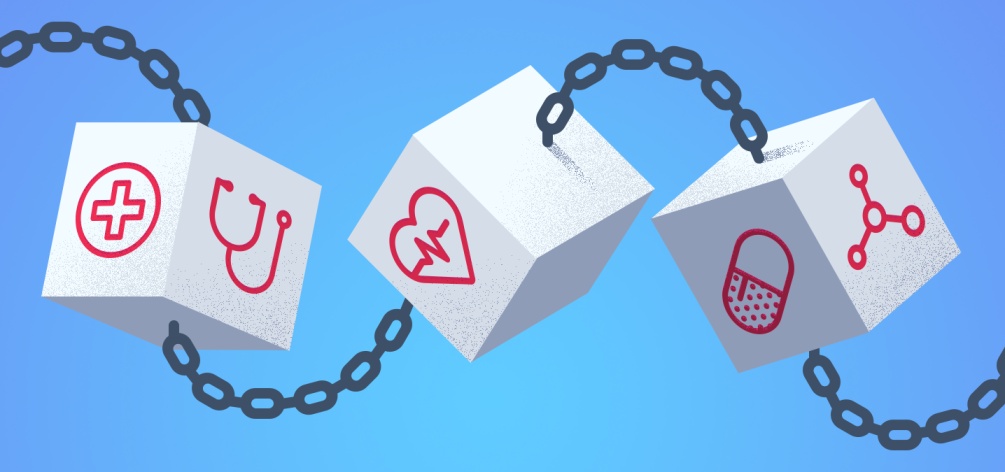
How Blockchain the supporting backbone technology behind crypto is helping groom the Healthcare sector Immensely.
One of the most commonly used buzzwords in the medical sector is This is due to the fact that the technology is known as "blockchain."
To put it simply, Blockchain has the potential to transform the healthcare industry.
With the help of its Patients may be genuinely focused on at the heart of everything with complete deployment.
Operations, which will be completely modernized with improved technology.
Accessibility, security, and privacy are all important considerations.
But, exactly, how does blockchain work? Actively be enable in everything or every sector?
Blockchain technology has the potential to improve health care by putting the patient at the centre of the system and improving health data security, privacy, and interoperability.By making electronic medical records more efficient, disintermediated, and secure, this technology might create a new paradigm for health information exchanges (HIE). While this new, fast expanding discipline is not a cure, it does provide fertile ground for experimentation, investment, and proof-of-concept testing.
A proof of concept (POC) is a first test of an idea, method, or product in real-world circumstances to demonstrate its potential and viability.
A proof of concept is a tiny, relatively simplistic or underdeveloped version of the desired ultimate product that is created during the ideation phase of a project—before serious design and engineering work actually begins on the project.
A proof of concept is used to confirm assumptions and demonstrate the viability of a new product or idea. Team members can use the proof of concept as a tangible way to help identify any unforeseen risks in the production or execution of the product or idea.
So in a nutshell just like the block work together to provide a tangible solution to validate transactions in a block through Proof of Work mechanism
You can investigate how blockchain technology can assist enhance healthcare
services.
This will assist you in better understanding how blockchain
technology may be used in healthcare to improve services and profitability.
Benefits and applications of blockchain in healthcare
Consider how blockchain technology might assist healthcare organisations enhance their offerings.
This will assist you in gaining a better knowledge of how blockchain technology may be used in healthcare to enhance services and increase profitability.
1. Aids research
All health organisations linked to certain blockchains, such
as Ethereum, may access each other's data. Patient health records, medicine
provided to patients, symptoms and ultimate results from certain health
treatments, and so on are examples of data.
Researchers and other organisations can enhance their
clinical research on drugs, therapies, and other topics because of the large
range of data available.
2. Ease of access to patient information
With the use of blockchain, patients may swiftly collaborate with various health groups.
Patients can share their health records with other doctors using a sharable private key if their records are stored on a certain blockchain.
Patients may also share their health records with laboratories, medical stores, and any other location that requires the information.
It allows patients to avoid having to manage and preserve their health information in tangible files and registers, as well as taking it about with them at all times.
3.
Enhances the precision of healthcare services
Patients' reports can be shared across healthcare providers, laboratories, and medical personnel.
Data exchange that is rapid and straightforward aids health organisations in improving their job and providing better treatment to patients.
By allowing health practitioners to access all data, this technology helps to eliminate misinterpretation.
Another benefit of avoiding misunderstanding is that it improves service accuracy.
4. Protecting patient information
A blockchain, as we all know, is a decentralised database that is distributed globally.
Hackers will find it very hard to steal patient data due to the widespread dissemination of databases.
Patients' private keys can only be accessed by patients and authorised health organisations.
Patients' data will be more secure thanks to the decentralisation of the blockchain ecosystem.
5. Medical supply tracking
Medical supplies and other healthcare-related data are transparent thanks to blockchain servers.
Some applications also assist in the tracking of labour expenses and carbon emissions associated with the production of these items.
Medical professionals may also utilise this encrypted ledger technology to keep
track of drug stockpiles in the event of an emergency.
6. Verifying healthcare benefits
To eliminate data tampering in health insurance-related services, using blockchain to verify health insurance may be a better approach. This distributed ledger helps health insurance companies avoid losing money by avoiding them from being caught up in client fraud.
Because the data contained in this encrypted ledger can't be changed, it helps insurance companies defend themselves against health-care-related fraud.
7. Disease Monitoring
By giving access to patients' data from anywhere, this encrypted ledger aids in real-time disease report tracking. With the use of blockchains, health institutions may also uncover illness trends by looking at several patients' data at the same time.
Disease tracking aids health-care organisations in improving disease treatments.
Professionals will be able to better cure specific ailments and operations by doing thorough studies on data available on the blockchain.
8. It safeguards genetic data.
Professionals are increasingly concerned about the theft of genetic data. By
safeguarding all of these associated genetic data on their decentralized
computers, blockchain has its back.
By making it hard for hackers to acquire all of the individual data sources on their systems, this cryptographic ledger improves the security of genetic data.
By the way, if you're not familiar with genetic data. It's a database that has all of the information on genomes. Genomes refer to the entire collection of genes in biology. You now have a better understanding of how technology may help to enhance healthcare services.